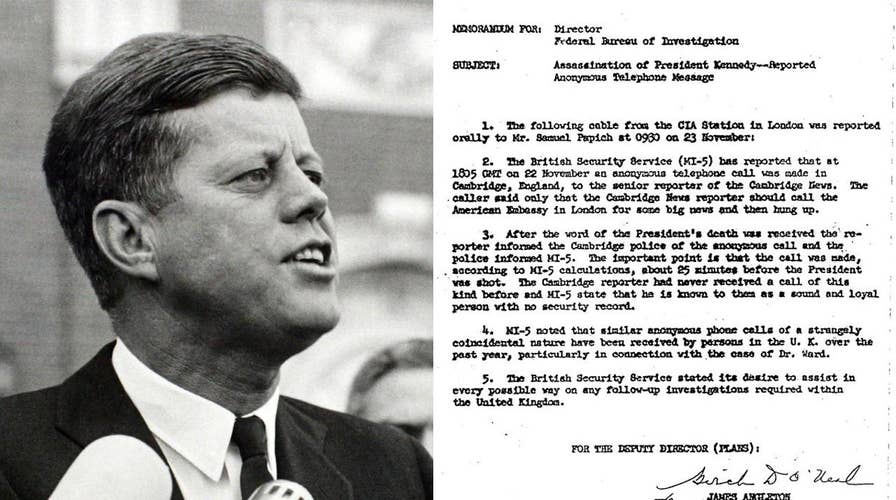JFK files: First look at records open new questions
The National Archives released over 2,800 previously secret documents related to the 1963 assassination of President John F. Kennedy. Here are some of the more interesting takeaways we know of so far from the first look at records related to Hoover, L.B.J. and Fidel Castro.
A senior reporter at a British newspaper received an anonymous phone call prior to President John F. Kennedy’s assassination, alerting the reporter to “some big news” about 25 minutes in advance, according to a CIA file released Thursday.
“The caller said only that the Cambridge News reporter should call the American Embassy in London for some big news and then hung up,” reads the document from former CIA Deputy Director James Angleton.
The reporter, who was not identified in the Nov. 26, 1963, report, “never received a call of this kind before and MI5 said that he is known to them as a sound and loyal person with no security record.” (MI5 is Britian's Security Service, similar to the CIA in the United States.)
After Kennedy’s death, the reporter told the Cambridge police about the call and the police informed MI5. "The important point is that the call was made, according to MI5 calculations, about 25 minutes before the President was shot.”
On Thursday, President Donald Trump blocked the release of hundreds of records on the 1963 assassination of President John F. Kennedy, bending to CIA and FBI appeals, while the National Archives came out Thursday night with a hefty cache of others.
“I have no choice,” Trump said in a memo, citing “potentially irreversible harm” to national security if he were to allow all records to come out now. He placed those files under a six-month review while letting 2,800 others come out, racing a deadline to honor a law mandating their release.
The documents that were released show federal agents madly chasing after tips, however thin, in the days after the Nov. 22, 1963, assassination and juggling rumors and leads worldwide.
The materials also cast a wide net over varied activities of the Kennedy administration, such as its covert efforts to upend Fidel Castro's government in Cuba.
A CIA spokesperson told Fox News that the agency had released all but 18,000 of its more than 87,000 documents related to the assassination and promised that the outstanding records would be made available.
The spokesperson added that some of the remaining documents contained redactions that "were undertaken with the intent to protect information in the collection whose disclosure would harm national security -- including the names of CIA assets and current and former CIA officers, as well as specific intelligence methods and partnerships that remain viable to protecting the nation today."
The Associated Press contributed to this report.












































